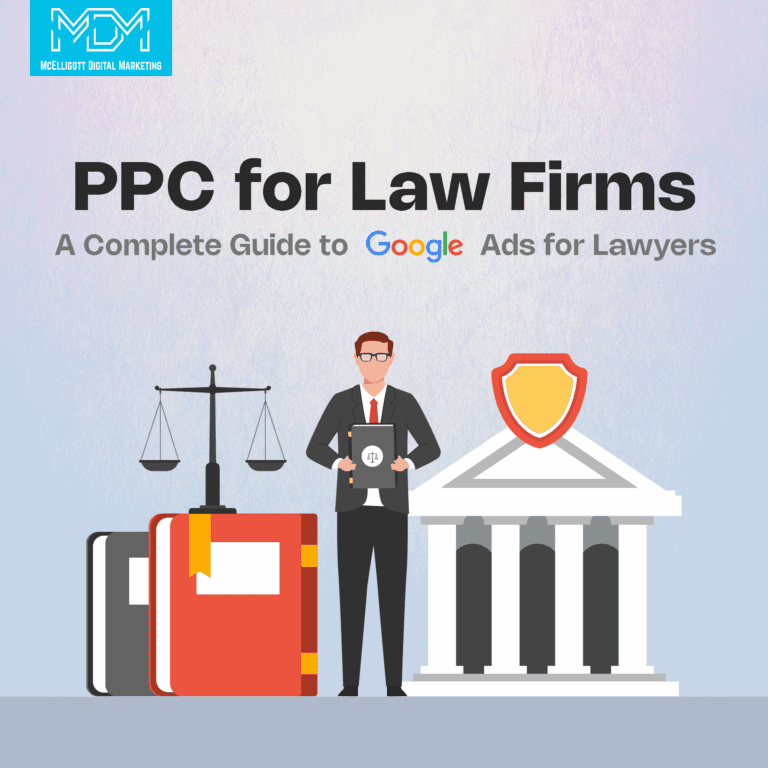How do we know something? This is an important question for marketers and business owners alike. And one of the quickest ways to know is to search it online.
We rarely open a phone book or rely only on word of mouth when searching for something. If people are seeking legal help, they turn to Google and type queries like “divorce lawyer near me” or “best criminal defense attorney in Missouri.” For law firms, this creates both a challenge and an opportunity. The challenge is competition. Many lawyers are trying to attract the same clients. The opportunity is pay-per-click (PPC) advertising, most commonly run through Google Ads.
PPC allows law firms to appear at the very top of search results when potential clients are actively looking for legal help. Unlike traditional marketing, you don’t pay just to be seen. You only pay when someone clicks on your ad. This makes PPC one of the fastest and most effective ways for lawyers to connect with people who need their services right away.
In this complete guide, we’ll walk through everything you need to know about PPC for law firms, from setting up Google Ads campaigns and choosing the right keywords to writing compelling ad copy, budgeting wisely, and avoiding common mistakes.
Why is PPC important for law firms?
The legal field is crowded. Every city has many lawyers competing for the same clients. Getting noticed is not easy.
Traditional marketing, like print ads or billboards, did help, but they are slow and expensive. Search Engine Optimization (SEO) is valuable, too, but it takes months to show results. Law firms that need clients quickly cannot wait that long.
This is where Pay-Per-Click (PPC) advertising makes a difference. With Google Ads, your firm can appear at the top of search results within hours of launching a campaign. When someone searches for “personal injury lawyer near me” or “family attorney,” your ad can show up instantly. That means you reach people at the exact moment they are looking for legal help.
Another advantage is targeting. You can choose who sees your ads by location, keyword, and even time of day. This ensures your budget is spent only on people most likely to hire you.
PPC also gives control. You set your daily budget, track results, and adjust as needed. If a keyword or ad is not working, you can change it right away. This flexibility is rare in other forms of advertising.
For law firms, PPC is more than just advertising. It is a direct line to people who are ready to take action now.
How does Google Ads work?
Google Ads runs on a simple idea. You choose keywords that match what people type into Google. When someone searches using those keywords, your ad can appear at the top of the results.
You don’t pay just for showing up. You pay only when someone clicks your ad. This is why it’s called pay-per-click (PPC).
But Google does not only look at money. It also looks at how relevant your ad is. This is measured through something called Quality Score. If your keywords, ad copy, and landing page match well, your score goes up. A higher score often means lower costs per click and better ad positions.
Another factor is Ad Rank. This decides which ad shows first, second, or third. Ad Rank depends on both your bid (how much you’re willing to pay) and your Quality Score.
For law firms, this means success is not only about spending more. Writing clear ads, choosing the right keywords, and having strong landing pages can help you compete, even against firms with bigger budgets.
Google Ads rewards relevance. The more useful your ad is to the searcher, the better your chances of winning clicks at a lower cost.
Setting up a PPC campaign for law firms
Running a PPC campaign feels overwhelming at first. But when broken into steps, the process becomes clear and manageable. Here is a complete walkthrough designed for Google Ads for law firms.
Step 1: Create a Google Ads account
Go to ads.google.com and set up your account. Enter your business information, payment details, and billing method. This step is quick, but it is the foundation of your entire campaign.

Step 2: Define your campaign goals
Before spending money, decide what “success” means for your firm. Google Ads allows you to set different campaign goals.
- Phone calls– Best for lawyers who want potential clients to call right away.
- Website visits– Useful if you want visitors to read about your services or fill out forms.
- Leads or consultations– Ideal if you offer online booking for legal consultations.

Clear goals guide every decision- keywords, ad copy, landing pages, and budget. Without goals, it is easy to waste money.
Step 3: Do keyword research
Keywords are the backbone of your campaign. They connect your ad with what people search on Google. For law firms, keywords must be specific and intent-driven.
Instead of broad words like “lawyer,” target phrases like “car accident lawyer in Missouri” or “child custody attorney near me.”
Use tools like Google Keyword Planner or SEMrush to discover search terms and estimate costs per click.
Don’t ignore negative keywords. These are terms you don’t want your ads to show for, such as “free legal advice” or “lawyer jobs.” Negative keywords save money by filtering out irrelevant traffic.
Step 4: Choose the campaign type
Google Ads offers multiple types of campaigns: Search, Display, Video, and more. For law firms, Search Campaigns are the most effective. These are text-based ads that appear when someone searches for legal services.

Example: A person types “personal injury lawyer Los Angeles.” A Search ad for your firm appears at the top.
Display and Video ads are better for brand awareness but not for immediate client leads. Stick to Search ads when starting.
Step 5: Set your budget and bids
Budgeting in PPC is flexible. You decide how much you want to spend each day. Start small, then scale as you see results.
Many law firms begin with $50–$100 per day in smaller cities. In competitive markets like New York or Los Angeles, you may need higher budgets.
Bidding– You can set how much you are willing to pay for each click. Google will not go over this amount. Focus on balance, don’t bid too low (your ads won’t show) or too high (you’ll burn through budget fast).
Step 6: Organize ad groups
Within a campaign, you can create Ad Groups to keep things structured. Each Ad Group should focus on a single legal service.
Example- One Ad Group for “Divorce Lawyer,” another for “Criminal Defense Lawyer.”
Each Ad Group will have its own set of keywords and ads.
This setup improves relevance, which helps your Quality Score and lowers costs.
Step 7: Write and upload ads
For each Ad Group, create multiple ads. Google rotates them and shows the best-performing ones more often.
Headlines should mention the service clearly (“Top Divorce Lawyer in Missouri”).
Descriptions should highlight benefits (“Free Consultation. 20+ Years Experience. Call Today.”).
Add extensions like phone numbers, locations, and links to specific service pages.
Step 8: Set up conversion tracking
Before launching, install conversion tracking. This helps you measure results. You can track:
- Calls from ads.
- Form submissions.
- Online consultation bookings.
Without tracking, you won’t know if clicks are turning into real clients.
Step 9: Launch and monitor
After reviewing everything, launch your campaign. But this is not the end. PPC needs active monitoring.
- Check which keywords bring calls and leads.
- Pause or adjust underperforming ads.
- Increase the budget on ads that convert well.
Choosing the right keywords
Keywords decide who sees your ad. The right choice can bring high-quality leads. The wrong choice can waste money.
For law firms, focus on specific and local keywords. Instead of using a broad term like “lawyer,” use phrases such as “personal injury lawyer”. These are called high-intent keywords because people searching them usually need legal help right away.
Google Ads offers different keyword match types.
- Broad match– Reaches a wide audience but may show for irrelevant searches.
- Phrase match– Shows ads when the search includes your chosen phrase.
- Exact match– Triggers ads only when the exact term is searched.
A smart strategy is to use phrase match and exact match for precision.
Don’t forget negative keywords. These block your ads from showing on irrelevant searches like “free lawyer” or “lawyer jobs.” Adding them saves money and ensures only potential clients see your ad.
Regularly review search terms in your campaign. Add new, valuable keywords and update your negative list. This keeps your ads focused and your budget under control.
Also read: How to Use ChatGPT with Google Ads?
How to write an effective ad copy for law firms?
Your ad copy is the first thing people see. Clear, persuasive ads get clicks. Confusing or generic ads do not.
Start with a strong headline. Include the service and location. Example: “Top Divorce Lawyer in Missouri.” This tells searchers immediately that your firm can help them.
Next, write a short description. Focus on benefits. Mention experience, success rate, or free consultations. Example: “20+ Years Experience. Free Initial Consultation. Call Today.”
Always include a call to action (CTA). Words like “Call Now,” “Book Your Consultation,” or “Get Legal Help Today” guide users to take action.
Use ad extensions to add value.
- Call extensions show your phone number directly in the ad.
- Location extensions highlight your office address.
- Sitelink extensions link to specific service pages like “Personal Injury” or “Family Law.”
Test multiple versions of your ad. Google shows the best-performing ads more often. Change headlines, descriptions, and CTAs to see which gets the most clicks and conversions.
Good ad copy builds trust. It attracts the right clients and encourages them to contact your firm immediately.
Conclusion
Google Ads for lawyers is a fast and effective way to reach high-intent clients. Choosing the right keywords, writing clear ads, and creating focused landing pages will help your firm attract leads ready to take action.
However, tracking and measuring your PPC success is essential. Use tools like Google Ads conversion tracking and Google Analytics to monitor clicks, calls, and form submissions. This data helps optimize campaigns, adjust budgets, and improve results over time.
If you want your firm to reach more clients efficiently without wasting money, it’s time to take PPC for lawyers seriously. Our PPC experts at McElligott Digital Marketing would love to build a campaign for you that brings visible results.
Book a FREE consultation with our Google Ads experts now at (833) 772-4897.





